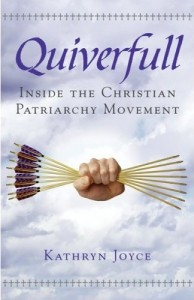
Kathryn Joyce’s Quiverfull makes clear the inherent conflict between The Bible and feminism. Although the idea that this conflict exists is still controversial, even among feminists, this is the implicit message of the book.
Quiverfull is divided into three parts: wives, mothers, and daughters. Although the title refers explicitly to the Bible verse that informs a specific view of childbearing, the book looks at Christian Patriarchy as whole. Christian Patriarchy is a way of life defined by a strict interpretation of the Bible’s prescriptions for gender, marital and family roles – including that wives be submissive to their husbands, that men be the heads of their households and that children – especially daughters – be subject to their fathers in all matters.
The first section explains the Christian Patriarchy’s view of marriage. Joyce spent a weekend at a retreat of “The Apron Society,” an event designed to fulfill the commands in Titus 2, which calls older women to instruct the younger ones about marriage and family life. The weekend did not focus on improving communication skills or child care, but about Proverbs 31 and hospitality. What struck me as I read about these incredibly earnest women was a comparison between their attempts at “Biblical Womanhood” and that of Rachel Held Evans. Evans made her attempt to live precisely by the Bible in good faith, but also with a smile and an easygoing, carefree attitude. There was no friendly wink to the reader here. To the women of The Apron Society, being a good hostess wasn’t just something to do for fun or to be kind – it was a matter of their eternal salvation itself.
A disturbing undercurrent of Christian Patriarchy is that women’s lives don’t matter. This is made clear when Joyce reviews the writings of Debi Pearl, author of Created to Be His Helpmeet and other books about marriage for Christian women. Perl explains how women don’t need to enjoy sex, that close female friendships can be a sinful “spiritual masturbation” and that your life itself is worth sacrificing for the sake of being a properly submissive wife. Perl writes about a woman who came to her for advice after her husband had tried to kill her with a knife while she was pregnant. Perl said this might be grounds for divorce, but that she could also try to win him back by being kind and never speaking of the abuse again. According to Perl, once the woman kept quiet, everyone lived happily ever after. That this is extremely dangerous advice is beside the point. Perl sees nothing wrong with suggesting the woman risk her life and the lives of her children for the sake of her religion.
The section on motherhood was very different than what I had expected. I thought I was going to get a TLC like view into homes with dozens of smiling and identically dressed children, or alternately, horror stories about endless housework and abuse. What Joyce described was a group of people who worship fertility almost as much as they worship Jesus. When common sense or medical advice suggests something incompatible with their worldview, they of course side with their faith.
Christian Patriarchy is not just an ideal for family life. There are a set of political values and beliefs that go along with it. Conservative think tanks and churches have funded such projects as the Natural Family Manifesto the World Congress of Families, and the Population Research Institute. And these aren’t just places for conservative Christians to get cushy jobs. Their lobbying has real impact on the laws of the United States. Joyce does not go into the policy implications specifically – but it’s easy to guess what some of them might be. The WCF has lobbied extensively against the UN Convention on the Rights of the Child, and of course, CEDAW – the Convention on Elimination of all forms of Discrimination Against Women. Within our own borders, PRI would like to make all abortions illegal. Reading through the parts of the book about these organizations made clear to me the links between theocracy, natalism and fascism.
The section about daughters is the shortest in the book, and much of what Joyce talks about is similar to what Jessica Valenti covered in the Purity Myth. Young women in these homes are taught to prize virginity above all else, to revere their fathers as the ultimate authority in their lives and to wait patiently to be betrothed.
Although Joyce meets many Christians in the book who are kind and warm to her, and some who seem like they are genuinely nice people, it was clear to me that their fundamentalism has elegantly solved the obvious conflicts between feminism and Christianity. While I think that treating women with dignity and respect is more important than leaving yourself open to charges of hypocrisy, the choice is not as clear for others as it is to me.
To be clear, I know lots of Christians who are also feminists. How they resolve their belief in women’s equality with their belief that the Bible is a Holy Book is something I don’t understand. It must require a complicated set of caveats and a faith so strong as not to be shaken by the conflict between their belief in women’s autonomy and the Bible’s decrees that women are unworthy. The Christian Patriarchy movement is by comparison incredibly simple. Dark, bizarre, harmful and hurtful. But as plain as the words on the page.



